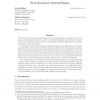Free Online Productivity Tools
i2Speak
i2Symbol
i2OCR
iTex2Img
iWeb2Print
iWeb2Shot
i2Type
iPdf2Split
iPdf2Merge
i2Bopomofo
i2Arabic
i2Style
i2Image
i2PDF
iLatex2Rtf
Sci2ools
126
click to vote
COLT
2005
Springer
2005
Springer
From External to Internal Regret
External regret compares the performance of an online algorithm, selecting among N actions, to the performance of the best of those actions in hindsight. Internal regret compares the loss of an online algorithm to the loss of a modified online algorithm, which consistently replaces one action by another. In this paper we give a simple generic reduction that, given an algorithm for the external regret problem, converts it to an efficient online algorithm for the internal regret problem. We provide methods that work both in the full information model, in which the loss of every action is observed at each time step, and the partial information (bandit) model, where at each time step only the loss of the selected action is observed. The importance of internal regret in game theory is due to the fact that in a general game, if each player has sublinear internal regret, then the empirical frequencies converge to a correlated equilibrium. For external regret we also derive a quantitative re...
Related Content
| Added | 13 Oct 2010 |
| Updated | 13 Oct 2010 |
| Type | Conference |
| Year | 2005 |
| Where | COLT |
| Authors | Avrim Blum, Yishay Mansour |
Comments (0)

